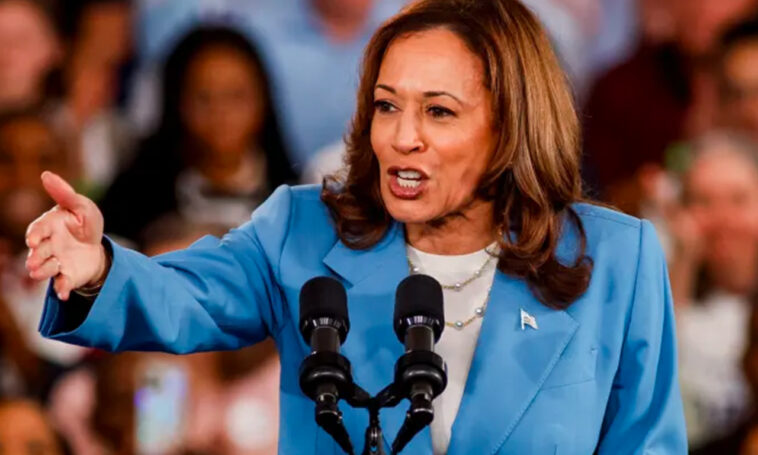Vice President Kamala Harris accuses Donald Trump of fostering ties with autocrats, labeling him an aspiring dictator.
Vice President Kamala Harris delivered a strong critique of Donald Trump during the Democratic National Convention in Chicago on Thursday night. As she accepted the Democratic presidential nomination, Harris did not hold back in her condemnation of the Republican nominee. She asserted that Trump “wants to be an autocrat” and criticized his relationships with global dictators.
“I will not cozy up to tyrants and dictators like Kim Jong-Un, who are rooting for Trump,” Harris declared. “Because they know he is easy to manipulate with flattery and favors. They know Trump won’t hold autocrats accountable — because he wants to be an autocrat.”
Harris emphasized her commitment to defending America’s security and upholding its ideals. She contrasted her approach with what she portrayed as Trump’s willingness to align with authoritarian leaders. “As President, I will never waver in defense of America’s security and ideals,” she affirmed, signaling a clear policy direction for her potential administration.
Following Harris’s remarks, Trump responded on social media, targeting her strength and effectiveness. On Truth Social, he wrote, “The Tyrants are laughing at her, she’s weak and ineffective, and for three and a half years she has done nothing except enabled them to get STRONG, RICH, and POWERFUL!”
Harris’s comments were part of a broader narrative at the convention, where several Democratic speakers highlighted Trump’s relationships with global dictators as a threat to national security. This theme was echoed by other prominent Democrats who presented Trump as a danger to both America and its international standing.
Representative Elissa Slotkin of Michigan, a Democratic candidate for a Senate seat, spoke about the crucial choice facing voters. She stated, “Because the choice in November is stark: America retreating from the world, or leading the world. Trump wants to take us backwards.” Slotkin, with her background as a CIA analyst and military veteran, underscored the potential regression in U.S. global leadership under Trump.
Senator Mark Kelly of Arizona, also a former military pilot and astronaut, criticized Trump’s disregard for national security protocols. “As president, Trump skipped his intelligence briefings,” Kelly noted. “He was too busy sucking up to dictators and dreaming of becoming one himself. Trump thinks Americans who have made the ultimate sacrifice are ‘suckers’ and ‘losers.’ If we fall for it again, and make him commander-in-chief, the only suckers would be us.”
Kelly further highlighted the severe threats the nation faces, arguing that another Trump term would endanger America’s position on the world stage. He claimed that Trump is ridiculed internationally, making it clear that a second term could undermine U.S. credibility and security.
Throughout the convention, the Democratic Party presented a unified front, portraying Trump as a destabilizing force both domestically and internationally. Harris’s speech was a centerpiece, setting the tone for the party’s platform centered on security, accountability, and leadership.
Harris’s criticism extends beyond personal attacks, targeting Trump’s policy and alliances. By accusing him of wanting to be an autocrat and associating with tyrants, she frames the election as a critical battle between democratic values and authoritarian tendencies. This messaging aims to rally Democratic voters around the theme of protecting and promoting American ideals.
The Vice President’s remarks resonate with the Democratic base, appealing to concerns about Trump’s leadership style and foreign policy. Her assertion that she will not align with dictators contrasts sharply with Trump’s established reputation of courting controversial leaders, thereby positioning herself as a more responsible and principled leader.
The convention also showcased the Democratic Party’s focus on national security and global leadership, with speakers like Slotkin and Kelly reinforcing Harris’s message. Their combined efforts aim to present a cohesive argument that electing Harris will ensure America remains a strong and respected leader in the world.
As the convention drew to a close, Harris reiterated her commitment to American security and values. Her speech was met with enthusiastic applause, reflecting the party’s confidence in her leadership. The Democratic National Convention served as a platform for Harris and her allies to outline a vision of America that rejects authoritarianism and embraces democratic principles.
In response to Harris’s statements, Trump’s supporters and critics alike weighed in, but the Democratic narrative remained strong. The emphasis on Trump’s potential autocratic tendencies and alliances with dictators seeks to sway undecided voters by highlighting the risks associated with his presidency.
Harris’s clear and direct condemnation of Trump underscores the high stakes of the upcoming election. By framing Trump as a threat to democracy and national security, she aims to galvanize support for her campaign and differentiate herself from her opponent.
As the election approaches, Harris’s message will likely continue to be a central theme in Democratic campaigns, emphasizing the importance of strong, principled leadership in maintaining America’s security and global standing. Her critique of Trump’s desire to be an autocrat serves as a rallying point for those concerned about the direction of the country under his potential leadership.
Vice President Kamala Harris’s scathing remarks about Donald Trump at the Democratic National Convention highlight the deep divisions between the two candidates. Harris’s focus on security, accountability, and democratic values positions her as a counter to Trump’s alleged authoritarian inclinations, setting the stage for a pivotal election battle.







Join the Community and Be a Part of the Conversation
You must be logged in or registered to post a comment.